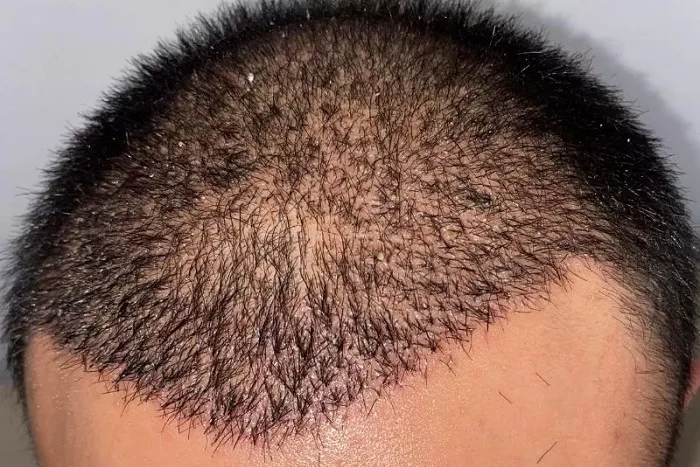Hair transplantation has become a common and effective solution for individuals suffering from hair loss. However, like any surgical procedure, it can come with post – operative discomforts, and nerve pain is one of the concerns that patients often have. Understanding the duration and nature of this nerve pain is crucial for both patients and medical professionals.
The Anatomy of the Scalp and Nerves Involved in Hair Transplant
Scalp Anatomy Basics
The scalp is a complex structure composed of several layers. The skin, subcutaneous tissue, galea aponeurotica, loose areolar tissue, and pericranium are the main layers. Nerves in the scalp play a vital role in providing sensation. The main nerves include the supraorbital nerve, supratrochlear nerve, zygomaticotemporal nerve, auriculotemporal nerve, greater occipital nerve, and lesser occipital nerve.
Nerves Affected During Hair Transplant
During a hair transplant procedure, the surgeon makes incisions in the scalp to extract and implant hair follicles. These incisions can potentially affect the nerves in the area. The most commonly affected nerves are those in the donor and recipient areas. In the donor area, usually located at the back or sides of the head, nerves may be disrupted during the extraction process. In the recipient area, where the hair follicles are implanted, nerve endings can be irritated by the surgical trauma.
Types of Nerve Pain After Hair Transplant
Acute Nerve Pain
Initial Onset: Acute nerve pain usually starts soon after the hair transplant procedure. It can be felt as a sharp, shooting pain or a burning sensation. This type of pain is often a result of the immediate trauma to the nerves during the surgery.
Duration: In most cases, acute nerve pain lasts for a few days to a week. During this time, the body’s natural inflammatory response is at its peak as it tries to repair the damaged tissues. The pain may be more severe during the first 2 – 3 days and then gradually subside as the swelling reduces and the initial healing process begins.
Chronic Nerve Pain
Occurrence: Chronic nerve pain is less common but can be more concerning. It may develop if there has been significant nerve damage during the procedure or if the initial healing process is disrupted. This type of pain can be persistent and may last for several weeks or even months.
Characteristics: Chronic nerve pain is often described as a dull, aching pain that may be accompanied by tingling or numbness. It can affect the patient’s quality of life, causing discomfort and interfering with normal daily activities.
Factors Affecting the Duration of Nerve Pain
Surgical Technique
Follicular Unit Extraction (FUE) vs. Follicular Unit Transplantation (FUT): The surgical technique used can have an impact on nerve pain duration. FUE, which involves extracting individual follicles, may cause less nerve damage compared to FUT, where a strip of tissue is removed. In FUT, there is a higher risk of affecting larger nerve branches in the donor area, potentially leading to longer – lasting nerve pain.
Skill of the Surgeon: The experience and skill of the surgeon play a crucial role. A highly skilled surgeon will be able to minimize nerve trauma during the procedure. They will have a better understanding of the scalp’s anatomy and be able to make precise incisions, reducing the likelihood of long – term nerve damage.
Patient’s Individual Characteristics
Age: Younger patients may have a better recovery rate and shorter nerve pain duration. Their bodies tend to have a more efficient healing process. Older patients may experience longer – lasting nerve pain due to reduced nerve regeneration capabilities.
Overall Health: Patients with pre – existing medical conditions such as diabetes, which can affect nerve function and healing, may have a prolonged nerve pain period. Good overall health, including a balanced diet and regular exercise, can promote faster healing and reduce nerve pain duration.
Post – operative Care
Medication: Proper use of post – operative medications can significantly affect nerve pain. Anti – inflammatory drugs can help reduce swelling and relieve acute nerve pain. In some cases, nerve – specific medications may be prescribed to manage chronic nerve pain.
Scalp Hygiene: Maintaining good scalp hygiene is essential. Keeping the scalp clean and free from infection can prevent additional trauma to the nerves. Avoiding excessive scratching or rubbing of the scalp can also help in reducing nerve irritation.
Management of Nerve Pain After Hair Transplant
Medications
Over – the – Counter Options: Non – steroidal anti – inflammatory drugs (NSAIDs) like ibuprofen can be effective in reducing mild to moderate nerve pain. They work by reducing inflammation around the damaged nerves. Topical creams containing lidocaine can also provide temporary relief by numbing the area.
Prescription Medications: In more severe cases of nerve pain, doctors may prescribe medications such as gabapentin or pregabalin.
These drugs are designed to calm the overactive nerves and reduce pain signals. However, they may have side effects, and patients need to be monitored closely.
Physical Therapy
Scalp Massage: Gentle scalp massage can help improve blood circulation in the area, which can promote nerve healing.
However, it should be done carefully and only after consulting with the doctor, especially during the early post – operative period.
Transcutaneous Electrical Nerve Stimulation (TENS): TENS therapy involves using a small electrical device to stimulate the nerves. This can help block pain signals and reduce nerve pain. It is usually performed under the guidance of a trained professional.
Conclusion
The duration of nerve pain after a hair transplant can vary widely depending on multiple factors, including the surgical technique, the patient’s individual characteristics, and the quality of post – operative care. Understanding these factors and implementing appropriate management strategies can help reduce the discomfort associated with nerve pain and ensure a smoother recovery process. Patients should communicate closely with their surgeons to address any concerns regarding nerve pain and to ensure the best possible outcome.

